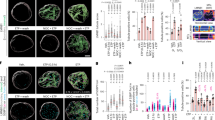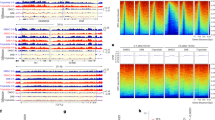Abstract
Disruption of Apc (adenomatous polyposis coli) within hepatocytes activates Wnt signalling, perturbs differentiation and ultimately leads to neoplasia. Apc negatively regulates Wnt signalling but is also involved in organizing the cytoskeleton and may have a role in chromosome segregation. In vitro studies have implicated Apc in the control of genomic stability. However, the relevance of this data has been questioned in vivo as Apc is lost earlier than the onset of genomic instability. Here we analyse the relationship between immediate loss of Apc and the acquisition of genomic instability in hepatocytes. We used Cre-lox technology to inactivate Apc and in combination with p53 in vivo, to define the consequences of gene loss on cell cycle regulation, proliferation, death and aneuploidy. We show that, although Apc loss leads to increased proliferation, it also leads to increased apoptosis, the accumulation of p53, p21 and markers of double-strand breaks and DNA repair. Flow cytometry revealed an increased 4N DNA content, consistent with a G2 arrest. Levels of anaphase bridges were also elevated, implicating failed chromosome segregation. This was accompanied by an increase in centrosome number, which demonstrates a role for Apc in maintaining euploidy. To address the role of p53 in these processes, we analysed combined loss of Apc and p53, which led to a further increase in proliferation, cell death, DNA damages and repair and a bypass of G2 arrest than was observed with Apc loss. However, we observed only a marginal effect on anaphase bridges and centrosome number, which could be due to increased cell death. Our data therefore establishes, in an in vivo setting, that APC loss leads to a DNA damage signature and genomic instability in the liver and that additional loss of p53 leads to an increase in the DNA damage signal but not to an immediate increase in the genomic instability phenotype.
This is a preview of subscription content, access via your institution
Access options
Subscribe to this journal
Receive 50 print issues and online access
$259.00 per year
only $5.18 per issue
Buy this article
- Purchase on Springer Link
- Instant access to full article PDF
Prices may be subject to local taxes which are calculated during checkout






Similar content being viewed by others
References
Fearon ER . Molecular genetics of colorectal cancer. Annu Rev Pathol 2011; 6: 479–507.
Clevers H . Wnt/β-catenin signaling in development and disease. Cell 2006; 127: 469–480.
Fodde R, Kuipers J, Rosenberg C, Smits R, Kielman M, Gaspar C et al. Mutations in the APC tumor suppressor gene cause chromosomal instability. Nat Cell Biol 2001; 3: 433–438.
Kaplan KB, Burds AA, Swedlow JR, Bekir SS, Sorger PK, Näthke IS . A role for the Adenomatous Polyposis Coli protein in chromosome segregation. Nat Cell Biol 2001; 3: 429–432.
Dikovskaya D, Schiffmann D, Newton IP, Oakley A, Kroboth K, Sansom O et al. Loss of APC induces polyploidy as a result of a combination of defects in mitosis and apoptosis. J Cell Biol 2007; 176: 183–195.
Hanson CA, Miller JR . Non-traditional roles for the Adenomatous Polyposis Coli (APC) tumor suppressor protein. Gene 2005; 361: 1–12.
Nasser M, Rusan NM, Peifer M . Original CIN: reviewing roles for APC in chromosome instability. J Cell Biol 2008; 181: 719–726.
Shih IM, Zhou W, Goodman SN, Lengauer C, Kinzler KW, Vogelstein B . Evidence that genetic instability occurs at an early stage of colorectal tumorigenesis. Cancer Res 2001; 61: 818–822.
Reed KR, Meniel VS, Marsh V, Cole A, Sansom OJ, Clarke AR . A limited role for p53 in modulating the immediate phenotype of Apc loss in the intestine. BMC Cancer 2008; 8: 162.
Sansom OJ, Griffiths DF, Reed KR, Winton DJ, Clarke AR . Apc deficiency predisposes to renal carcinoma in the mouse. Oncogene 2005; 24: 8205–8210.
Aoki K, Aoki M, Sugai M, Harada N, Miyoshi H, Tsukamoto T et al. Chromosomal instability by β-catenin/TCF transcription in APC or β-catenin mutant cells. Oncogene 2007; 26: 3511–3520.
Torre C, Perret C, Colnot S . Transcription dynamics in a physiological process: beta-catenin signaling directs liver metabolic zonation. Int J Biochem Cell Biol 2011; 43: 271–278.
Gougelet A, Colnot S . A complex interplay between Wnt/β-catenin signalling and the cell cycle in the adult liver. Int J Hepatol 2012; 2012: 816125.
Laurent-Puig P, Zucman-Rossi J . Genetics of hepatocellular tumors. Oncogene 2006; 25: 3778–3786.
Feng GJ, Cotta W, Wei XQ, Poetz O, Evans R, Jardé T et al. Conditional disruption of Axin1 leads to development of liver tumors in mice. Gastroenterology 2012; 143: 1650–1659.
Jain S, Chang TT, Hamilton JP, Lin SY, Lin YJ, Evans AA et al. Methylation of the CpG sites only on the sense strand of the APC gene is specific for hepatocellular carcinoma. PLoS ONE 2011; 6: e26799.
Hussain SP, Schwank J, Staib F, Wang XW, Harris CC . TP53 mutations and hepatocellular carcinoma: insights into the etiology and pathogenesis of liver cancer. Oncogene 2007; 26: 2166–2176.
Pineau P, Marchio A, Battiston C, Cordina E, Russo A, Terris B et al. Chromosome instability in human hepatocellular carcinoma depends on p53 status and aflatoxin exposure. Mutat Res 2008; 653: 6–13.
Reed KR, Athineos D, Meniel VS, Wilkins JA, Ridgway RA, Burke ZD et al. B-catenin deficiency, but not Myc deletion, suppresses the immediate phenotypes of APC loss in the liver. Proc Natl Acad Sci USA 2008; 105: 18919–18923.
Sansom OJ, Reed KR, Hayes AJ, Ireland H, Brinkmann H, Newton IP et al. Loss of Apc in vivo immediately perturbs Wnt signaling, differentiation, and migration. Genes Dev 2004; 18: 1385–1390.
Hans F, Dimitrov S . Histone H3 phosphorylation and cell division. Oncogene 2001; 20: 3021–3027 (Review).
Weaver BA, Cleveland DW . Does aneuploidy cause cancer? Curr Opin Cell Biol 2006; 18: 658–667.
Godinho SA, Pellman D . Causes and consequences of centrosome abnormalities in cancer. Philos Trans R Soc Lond B Biol Sci 2014; 369: pii 20130467 (Review).
Vitre BD, Cleveland DW . Centrosomes, chromosome instability (CIN) and aneuploidy. Curr Opin Cell Biol 2012; 24: 809–815.
Guichard C, Amaddeo G, Imbeaud S, Ladeiro Y, Pelletier L, Maad IB et al. Integrated analysis of somatic mutations and focal copy-number changes identifies key genes and pathways in hepatocellular carcinoma. Nat Genet 2012; 44: 694–698.
Vaziri C, Faller DV . A benzo[a]pyrene-induced cell cycle checkpoint resulting in p53-independent G1 arrest in 3T3 fibroblasts. J Biol Chem 1997; 272: 2762–2769.
Bree RT, Neary C, Samali A, Lowndes NF . The switch from survival responses to apoptosis after chromosomal breaks. DNA Repair 2004; 3: 989–995.
Guerrero AA, Gamero MC, Trachana V, Fütterer A, Pacios-Bras C, Díaz-Concha NP et al. Centromere-localized breaks indicate the generation of DNA damage by the mitotic spindle. Proc Natl Acad Sci USA 2010; 107: 4159–4164.
Dikovskaya D, Newton IP, Nathke IS . The adenomatous polyposis coli protein is required for the formation of robust spindles formed in CSF Xenopus extracts. Mol Biol Cell 2004; 15: 2978–2991.
Bunz F, Dutriaux A, Lengauer C, Waldman T, Zhou S, Brown JP et al. Requirement for p53 and p21 to sustain G2 arrest after DNA damage. Science 1998; 282: 1497–1501.
Cross SM, Sanchez CA, Morgan CA, Schimke MK, Ramel S, Idzerda RL et al. A p53-dependent mouse spindle checkpoint. Science 1995; 267: 1353–1356.
Gisselsson D, Jonson T, Petersen A, Strombeck B, Dal Cin P, Hoglund M et al. Telomere dysfunction triggers extensive DNA fragmentation and evolution of complex chromosome abnormalities in human malignant tumors. Proc Natl Acad Sci USA 2001; 98: 12683–12688.
Hoffelder DR, Luo L, Burke NA, Watkins SC, Gollin SM, Saunders WS . Resolution of anaphase bridges in cancer cells. Chromosoma 2004; 112: 389–397.
Kops GJ, Weaver BA, Cleveland DW . On the road to cancer: aneuploidy and the mitotic checkpoint. Nat Rev Cancer 2005; 5: 773–785.
Castedo M, Perfettini JL, Roumier T, Andreau K, Medema R, Kroemer G . Cell death by mitotic catastrophe: a molecular definition. Oncogene 2004; 23: 2825–2837.
Hadjihannas MV, Behrens J . CIN by WNT: growth pathways, mitotic control and chromosomal instability in cancer. Cell Cycle 2006; 5: 2077–2081.
Caldwell CM, Green RA, Kaplan KB . APC mutations lead to cytokinetic failures in vitro and tetraploid genotypes in Min mice. J Cell Biol 2007; 178: 1109–1120.
Clarke AR, Cummings MC, Harrison DJ . Interaction between murine germline mutations in p53 and APC predisposes to pancreatic neoplasia but not to increased intestinal malignancy. Oncogene 1995; 11: 1913–1920.
Shibata H, Toyama K, Shioya H, Ito M, Hirota M, Hasegaw S et al. Rapid colorectal adenoma formation initiated by conditional targeting of the Apc gene. Science 1997; 278: 120–123.
Ireland H, Kemp R, Houghton C, Howard L, Clarke AR, Sansom OJ . Inducible Cre-mediated control of gene expression in the murine gastrointestinal tract: effect of loss of beta-catenin. Gastroenterology 2004; 126: 1236–1246.
Clarke AR, Purdie CA, Harrison DJ, Morris RG, Bird CC, Hooper ML et al. Thymocyte apoptosis induced by p53-dependent and independent pathways. Nature 1993; 362: 849–851.
Prost S, Sheahan S, Rannie D, Harrison DJ . Adenovirus-mediated Cre deletion of floxed sequences in primary mouse cells is an efficient alternative for studies of gene deletion. Nucleic Acids Res 2001; 29: E80.
Acknowledgements
We thank Mark Bishop (genotyping) and Derek Scarborough (histology). This work was financially supported by Cancer research UK RCBMA7613.
Author information
Authors and Affiliations
Corresponding author
Ethics declarations
Competing interests
The authors declare no conflict of interest.
Additional information
Supplementary Information accompanies this paper on the Oncogene website
Rights and permissions
About this article
Cite this article
Méniel, V., Megges, M., Young, M. et al. Apc and p53 interaction in DNA damage and genomic instability in hepatocytes. Oncogene 34, 4118–4129 (2015). https://doi.org/10.1038/onc.2014.342
Received:
Revised:
Accepted:
Published:
Issue Date:
DOI: https://doi.org/10.1038/onc.2014.342
This article is cited by
-
Network-based approaches elucidate differences within APOBEC and clock-like signatures in breast cancer
Genome Medicine (2020)
-
Wnt pathway is involved in 5-FU drug resistance of colorectal cancer cells
Experimental & Molecular Medicine (2018)
-
The p53 tetramer shows an induced-fit interaction of the C-terminal domain with the DNA-binding domain
Oncogene (2016)



